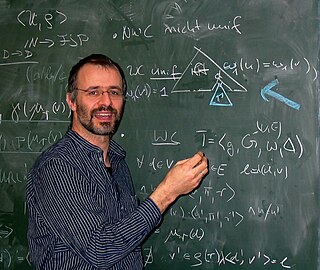The Informedia Digital Library is an ongoing research program at Carnegie Mellon University to build search engines and information visualization technology for many types of media. [1] [2]

Carnegie Mellon University (CMU) is a private research university based in Pittsburgh, Pennsylvania. Founded in 1900 by Andrew Carnegie as the Carnegie Technical Schools, the university became the Carnegie Institute of Technology in 1912 and began granting four-year degrees. In 1967, the Carnegie Institute of Technology merged with the Mellon Institute of Industrial Research to form Carnegie Mellon University. With its main campus located 3 miles (5 km) from Downtown Pittsburgh, Carnegie Mellon has grown into an international university with over a dozen degree-granting locations in six continents, including campuses in Qatar and Silicon Valley, and more than 20 research partnerships.

Information visualization or information visualisation is the study of (interactive) visual representations of abstract data to reinforce human cognition. The abstract data include both numerical and non-numerical data, such as text and geographic information. However, information visualization differs from scientific visualization: "it's infovis [information visualization] when the spatial representation is chosen, and it's scivis [scientific visualization] when the spatial representation is given".
The program has carried out research on Spoken Document Retrieval, Video Information Retrieval, Video Segmentation, face recognition, and Cross-language information retrieval.

A facial recognition system is a technology capable of identifying or verifying a person from a digital image or a video frame from a video source. There are multiple methods in which facial recognition systems work, but in general, they work by comparing selected facial features from given image with faces within a database. It is also described as a Biometric Artificial Intelligence based application that can uniquely identify a person by analysing patterns based on the person's facial textures and shape.
Cross-language information retrieval (CLIR) is a subfield of information retrieval dealing with retrieving information written in a language different from the language of the user's query. The term "cross-language information retrieval" has many synonyms, of which the following are perhaps the most frequent: cross-lingual information retrieval, translingual information retrieval, multilingual information retrieval. The term "multilingual information retrieval" refers more generally both to technology for retrieval of multilingual collections, and to technology which has been moved to handle material in one language to another. Cross-language information retrieval refers more specifically to the use case where users formulate their information need in one language and the system retrieves relevant documents in another. To do so, most CLIR systems use various translation techniques. CLIR techniques can be classified into different categories based on different translation resources:
The Lycos search engine was an early product of the Informedia Digital Library Project.

Lycos, Inc., is a web search engine and web portal established in 1994, spun out of Carnegie Mellon University. Lycos also encompasses a network of email, webhosting, social networking, and entertainment websites. The company is based in Waltham, Massachusetts, and is currently a subsidiary of Kakao.
The project is led by Howard Wactlar. Researchers on the project have included: Michael Mauldin, Alex Hauptmann, Michael Christel, Michael Witbrock, Raj Reddy, Takeo Kanade and Scott Stevens.
Michael Loren "Fuzzy" Mauldin is a retired computer scientist and the inventor of the Lycos web search engine.
Alexander G. Hauptmann is a Research Professor in the Language Technologies Institute at the Carnegie Mellon University School of Computer Science. He has been the leader of the Informedia Digital Library which has made seminal strides in multimedia information retrieval and won best paper awards at major conferences. He was also a founder of the international advisory committee for TRECVID.
Michael John Witbrock is a computer scientist in the field of artificial intelligence. Witbrock is a native of New Zealand and is the former Vice President of Research at Cycorp, which is carrying out the Cyc project in an effort to produce a genuine Artificial Intelligence.




